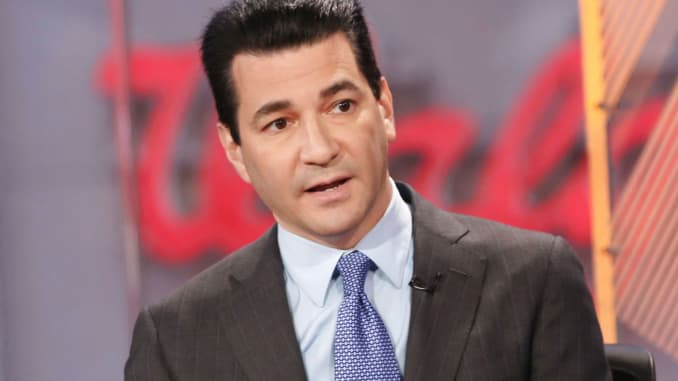- The U.S. is in the second inning of the coronavirus epidemic, said former FDA Commissioner Scott Gottlieb, a CNBC contributor who sits on the boards of Pfizer and biotech company Illumina.
- Cases are starting to plateau here and will hopefully abate in the summer, he said.
- However, he said the U.S. will face a “very different threat” heading into the fall, winter and spring of next year as the virus settles into a more “seasonal pattern.”

The U.S. is in the second inning of the coronavirus epidemic as the growth in newly confirmed Covid-19 cases slows, hopefully giving the country a “breather” over the summer, former Food and Drug Administration Commissioner Dr. Scott Gottlieb said at CNBC Events’ Healthy Returns virtual conference Tuesday.
“We’ve now seen the virus whip around the world and we’re now grappling with our own epidemic here in the United States and are starting to plateau and hopefully come down the epidemic curve,” said Gottlieb, a CNBC contributor who sits on the boards of Pfizer and biotech company Illumina.
However, he said the U.S. will face a “very different threat” heading into the fall, winter and spring of next year as the virus settles into a more “seasonal pattern.”
“We can all take a breather in the summer. I’m very worried about fall when we come back but I’m hopeful that infections start to break off later in the summer,” he said.
Until there is a vaccine or the country reaches a level of so-called herd immunity, transmission could continue, according to Gottlieb.
“And at some point, you get to a level of exposure as we continue on this slow burn where a lot of people have had it and transmission will start to slow down. But this is still the early innings to this epidemic,” he said.
Gottlieb also discussed the potential decrease in coronavirus transmission if new infections plateau for some time. While it’s unclear whether the U.S. can achieve herd immunity without a vaccine, he said most people will start developing a certain level of neutralizing antibodies. Herd immunity is achieved when most of the world’s 7.6 billion people are vaccinated or develop the antibodies, giving the virus nowhere to go.
“We should just assume that most people are going to develop a level of immunity that’s going to last a period of time of around a year or perhaps less for some people,” said Gottlieb.
Last week, he shared a preprint study that suggests herd immunity could be achieved at a lower threshold than what is typically assumed.
In most cases, 50% of the population needs to be infected in order to reach herd immunity at a reproduction rate of 2, and 66% needs to have been exposed at a reproduction rate of 3, Gottlieb explained at the virtual conference.
However, the study’s findings show that the U.S. can potentially reach herd immunity at a lower threshold of 40%.
He said seroprevalence studies from early April showed that up to 20% of the population in New York City was exposed to Covid-19 and developed neutralizing antibodies.
Given that this estimate is correct, Gottlieb said approximately 30% of New Yorkers could be exposed to the virus by the end of May and heading into June.
He added that if U.S. infection rates remain at current levels, which is about 30,000 new positive cases per day, through the summer, 15% of the U.S. population could be infected by Sept. 1.
“So you’re starting to get to levels where you haven’t quite reached herd immunity but transmission could potentially be slowed in the cities, particularly dense cities where you have more infections,” he said.
Earlier Tuesday, Gottlieb said states that eased coronavirus restrictions and began reopening nonessential businesses such as Alabama, South Dakota and Texas, have begun to see a jump in the number of confirmed cases.
“Most of us assumed that by May we’d be seeing sustained decline of new cases,” he said on CNBC’s “Squawk Box.” “We didn’t think that going into May after a month of mitigation we’d be at a sort of plateau where we wouldn’t be seeing steady declines of new cases, so we’re in a tough spot right now.”
The U.S. has more than 1.3 million confirmed cases of Covid-19 and at least 80,897 deaths, according to data from Johns Hopkins University. Globally, there are more than 4.2 million cases of the coronavirus and at least 287,158 fatalities.